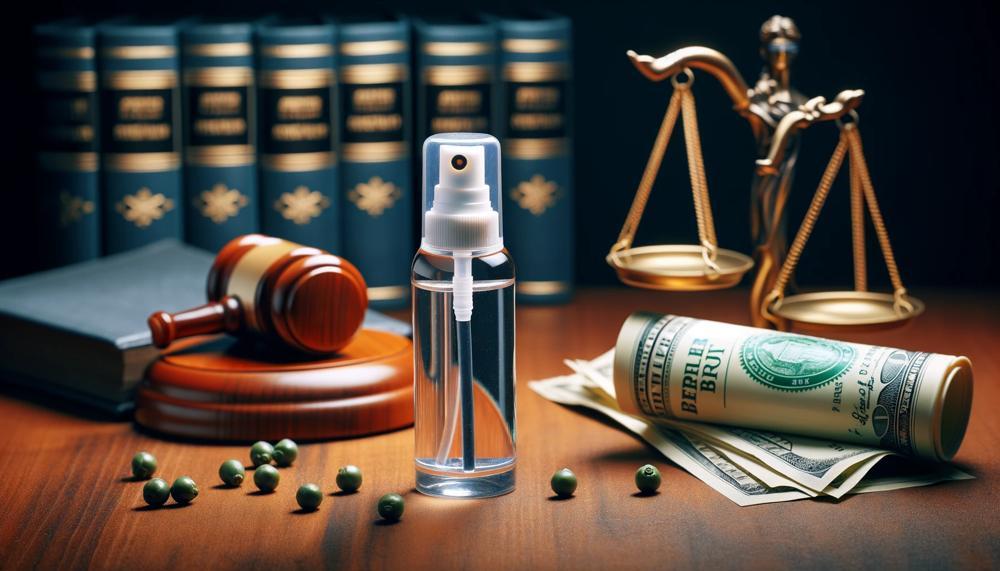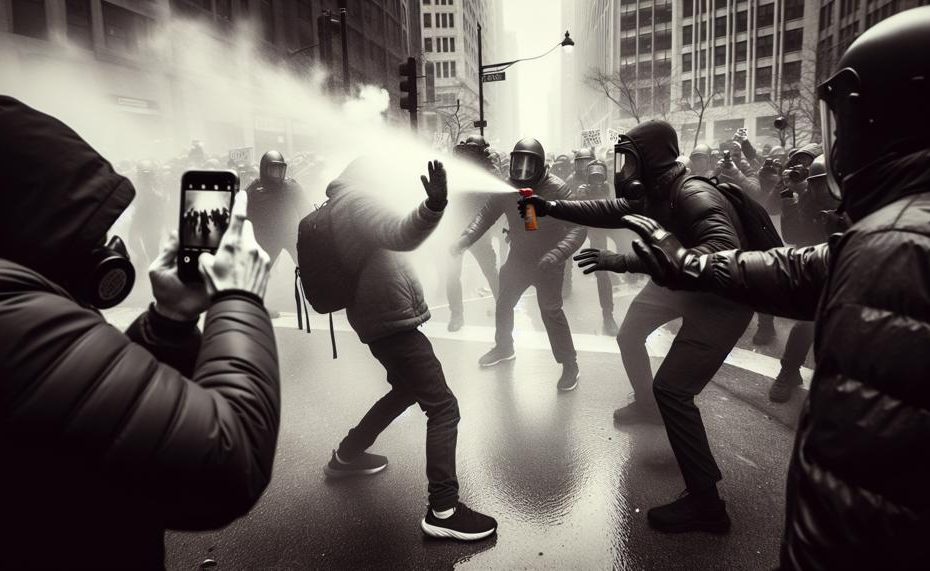Imagine strolling down the street, minding your own business, when suddenly you are hit with a burning sensation in your face. As you struggle to open your eyes and breathe, you realize that someone has pepper sprayed you.
To make matters worse, you later find out that this was not just a random attack, but rather an intentional act by someone who holds a grudge against you.
While it may seem like there is nothing you can do about it, did you know that there is legal recourse for such an incident? That’s right – if someone pepper sprays you without valid justification, you have the right to sue for damages.
Before taking any action, here are some important points to consider regarding suing for pepper spraying:
- Pepper spray is considered a form of assault and battery, which falls under civil law.
- The use of pepper spray must be justified by self-defense or defense of others.
- If the use of pepper spray was not justified, it can be deemed excessive force and result in a lawsuit.
- In addition to physical injuries, emotional distress and loss of income can also be claimed as damages.
- Gathering evidence such as witness statements and medical records is crucial in supporting your case.
- Seeking guidance from a personal injury lawyer can help assess the strength of your case and navigate the legal process.
Do not let someone get away with causing harm to you without facing consequences. Continue reading to discover more about suing for pepper spraying and how justice can be served.
Contents
Understanding Self-Defense Laws
Using pepper spray as a method of self-defense can have both legal and personal repercussions. While it is generally permitted to carry and use pepper spray for self-protection, there are specific limitations and guidelines that must be followed to avoid legal consequences. These include:
Understanding Self-Defense Laws
- Each state has its own unique laws and regulations regarding the use of pepper spray for self-defense.
- Some states may require a permit or have restrictions on the size and potency of the pepper spray canister.
- It is crucial to research and comprehend the laws in your particular state before carrying or using pepper spray.
Applying Reasonable Force
- In self-defense situations, using pepper spray is considered reasonable force.
- However, it must not go beyond what is necessary to protect oneself.
- Using excessive force or deploying pepper spray in non-life-threatening situations can result in legal repercussions.
Avoiding Assault or Battery Charges
- Although pepper spray can be an effective tool for self-defense, it can also be categorized as a weapon.
- Using pepper spray in a manner that causes harm or injury to another person may lead to assault or battery charges.
Potential for Legal Action
- If someone uses pepper spray against you without just cause, you may have grounds to sue for emotional distress or medical expenses.
- However, winning a lawsuit requires evidence and preparation, so it is vital to gather documentation and seek the assistance of a personal injury lawyer.
When Pepper Spray Use Is Legal
When the use of pepper spray is deemed to be unjustified or excessive, it may be because proper procedures were not followed.
Additionally, using pepper spray in an area where it is illegal or on a victim with pre-existing health conditions that may be exacerbated can also contribute to the situation being deemed inappropriate.
When Pepper Spray Use Is Illegal
There are specific circumstances where the use of pepper spray for self-defense can be deemed unlawful. These situations include:
- Using pepper spray as an offensive weapon: It is against the law to intentionally harm or cause trouble using pepper spray. Doing so can result in criminal charges and legal repercussions.
- Using pepper spray in restricted areas: There are designated locations where carrying and using pepper spray is strictly prohibited, such as government buildings, schools, airports, and public transportation. Violating these regulations can lead to fines or even imprisonment.
- Using excessive force: Pepper spray should only be used when there is an immediate threat of harm. If it is used on an individual who poses no danger, it can be considered excessive force and may result in legal consequences.
- Using it on individuals with health issues: People with certain health conditions, such as asthma or heart problems, may have severe reactions to pepper spray. Thus, using it on them can be viewed as illegal and may lead to legal repercussions.
- Purchasing or possessing pepper spray illegally: In some jurisdictions, there are limitations on buying or owning pepper spray based on a person’s criminal record, mental health status, or substance abuse history. Having or acquiring pepper spray in these situations can result in fines or criminal charges.
Can I Sue Someone for Pepper Spraying Me?
There are multiple potential legal avenues for pursuing a lawsuit against someone who has pepper sprayed you without valid justification. These can include claims of excessive force, assault, battery, and causing physical or emotional harm.
As the laws and regulations surrounding the use of pepper spray can differ from state to state, it is crucial to conduct thorough research and seek advice from a legal expert to determine the most appropriate course of action.
In most states, the use of pepper spray is strictly regulated and can only be used in self-defense or in defense of others. This means that if someone has used pepper spray against you without a valid reason, they may have violated these regulations and could face legal consequences.
For instance, in the state of California, the use of pepper spray must be justified by a reasonable belief that the use of force is necessary to protect oneself from imminent danger. If this requirement is not met, the individual who used pepper spray may be held responsible for their actions and could face criminal charges.
In addition to potential criminal charges, being pepper sprayed without just cause can also result in physical injuries such as temporary blindness, difficulty breathing, and severe pain. These injuries can have both short-term and long-term effects on an individual’s physical and emotional well-being, warranting potential claims for compensation.
However, pursuing legal action against someone who has pepper sprayed you can be a complex process. It is essential to gather evidence, seek medical attention for any injuries sustained, and consult with a legal professional to determine the best course of action.
Ultimately, whether or not you can successfully sue someone for pepper spraying you will depend on various factors such as the circumstances surrounding the incident and the laws in your state.
Building Your Case
| The legality of pepper spray in your state | It is crucial to research and understand the laws and regulations surrounding pepper spray use in your state before building your case. These laws may vary from state to state and can greatly impact the outcome of your legal action. |
| The intent of the person who sprayed you | In order to have a strong case for suing someone for pepper spraying you, it is important to prove that they had malicious intent or acted with negligence. Evidence such as witness statements, CCTV footage, or medical records can support your claim and prove the intent of the person who sprayed you. |
| The severity of injuries sustained | Pepper spray can cause serious harm and even death in some cases, making it crucial to document the extent of your injuries and any long-term effects. It is also important to note any pre-existing medical conditions that may have been aggravated by the pepper spray. |
| The circumstances surrounding the use of pepper spray | The situation in which you were sprayed, such as whether it was used in self-defense or by law enforcement during a lawful arrest, can greatly impact the outcome of your case. Gathering information on these circumstances is crucial when building your case. |
| The potential financial costs | Suing someone for pepper spraying you can be a lengthy and expensive process, so it is important to assess whether the potential compensation outweighs the cost of pursuing legal action. This includes not only legal fees, but also any medical expenses or loss of income due to the incident. |
Legal Process and Proceedings
The legal process and proceedings for taking legal action against someone who has used pepper spray against you in self-defense can vary depending on the specific circumstances of the incident and state laws.
However, the general steps and procedures involved in such a case are outlined below.
Step 1: Gathering evidence
The initial step in building a case for being pepper sprayed is to collect evidence that supports your claim.
This may include statements from eyewitnesses, medical records, and any video footage of the incident.
Step 2: Consulting with a lawyer
It is crucial to seek advice from a lawyer who specializes in personal injury cases to assess the strength of your case and guide you through the legal process.
Step 3: Attempting mediation or negotiation
Before filing a lawsuit, it is recommended to try and resolve the matter through mediation or negotiation.
This can potentially save time and money, as well as prevent a lengthy court battle.
Step 4: Filing a lawsuit
If mediation or negotiation fails, you can file a lawsuit against the person who pepper sprayed you.
This will involve submitting a complaint to the court and legally serving the defendant with legal papers.
Step 5: Proceeding through the legal system
The lawsuit will then proceed through the legal system, which may involve discovery (gathering evidence), depositions (sworn statements from involved parties), and ultimately a trial if the case cannot be settled out of court.
Step 6: Presenting evidence in court

During the trial, both sides will present their arguments and evidence. The burden of proof lies on the plaintiff (the person suing) to prove that the defendant was responsible for their injuries.
Step 7: Obtaining compensation or having the case dismissed
If the plaintiff successfully proves their case, they may receive damages for medical bills, lost wages, pain and suffering, and other related expenses.
However, if the defendant can successfully argue that their use of pepper spray was justified as self-defense, they may not be held liable.
Finding Legal Representation
It can be challenging to find a reputable lawyer, but there are several steps you can take to make the process easier. One strategy is to use search engines like Google or Bing to research online for law firms or individual lawyers who specialize in personal injury cases, such as those involving being pepper sprayed.
Additionally, seeking recommendations from friends, family, or colleagues who have hired a lawyer for a similar situation can be helpful.
Once you have a list of potential lawyers, it’s important to thoroughly check their credentials. Look into their education background, experience, specialized training and certifications, track record of successful cases, and any disciplinary actions taken against them. This information can help you determine which lawyers have the necessary qualifications and experience to handle your case effectively.
Another crucial step is setting up consultations with potential lawyers. This will give you the opportunity to discuss your case and assess each lawyer’s communication skills, understanding of your case, and approach to handling it. It’s essential to choose a lawyer with whom you feel comfortable and confident in their abilities.
Lastly, trust your instincts when making your final decision. Choose a lawyer who makes you feel at ease and with whom you can have clear communication and trust. Remember to take your time in choosing a reputable lawyer to ensure that they have the necessary experience, credentials, and trustworthiness to handle your case effectively. Use the table below as a summary of the steps to take when looking for a reputable lawyer.
| Step 1: Research online | Use search engines like Google or Bing to find law firms or individual lawyers who specialize in personal injury cases such as being pepper sprayed. |
| Step 2: Seek recommendations | Ask for recommendations from friends, family, or colleagues who may have hired a lawyer for a similar case. |
| Step 3: Check credentials | Look into the education background, experience, specialized training and certifications, track record of successful cases, and any disciplinary actions taken against potential lawyers. |
| Step 4: Set up consultations | Schedule consultations with potential lawyers to discuss your case and assess their communication skills, understanding of your case, and approach to handling it. |
| Step 5: Trust your instincts | Choose a lawyer who makes you feel comfortable and confident in their abilities and with whom you can have clear communication and trust. |
Conclusion
In conclusion, being pepper sprayed by someone without valid justification is not only a random act of violence, but also a deliberate and potentially harmful action.
Fortunately, there are legal options available for those who have been pepper sprayed. As discussed in this article, seeking compensation through civil law is possible if the use of pepper spray was unjustified or excessive force was used.
Remember, understanding self-defense laws and building a strong case are essential in seeking justice for being pepper sprayed.





